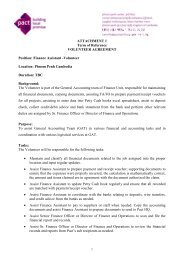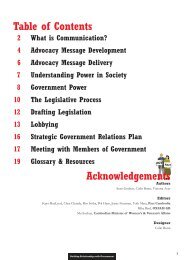Advocacy in Cambodia: Increasing Democratic ... - Pact Cambodia
Advocacy in Cambodia: Increasing Democratic ... - Pact Cambodia
Advocacy in Cambodia: Increasing Democratic ... - Pact Cambodia
You also want an ePaper? Increase the reach of your titles
YUMPU automatically turns print PDFs into web optimized ePapers that Google loves.
Case Studies<br />
before fir<strong>in</strong>g them, though this is rarely, if ever,<br />
done. Stakeholders generally agree that<br />
companies regularly dismiss union leaders<br />
without sufficient grounds. One tactic used by<br />
companies is giv<strong>in</strong>g union leaders three-month<br />
contracts and not renew<strong>in</strong>g them when they<br />
expire. However, most fired union leaders do<br />
have valid contracts and are fired without cause,<br />
or on bogus or trivial charges. Often when<br />
unions request that the M<strong>in</strong>istry re-<strong>in</strong>state<br />
illegally fired workers, the M<strong>in</strong>istry stalls until<br />
union leaders accept cash payoffs. An article <strong>in</strong><br />
the <strong>Cambodia</strong> Daily published on January 28,<br />
2002 described an <strong>in</strong>cident <strong>in</strong> which union<br />
leaders were allegedly offered $200 to leave<br />
their places of employment.<br />
The negative implications for labor<br />
federations of labor leader dismissals become clear<br />
when one realizes that s<strong>in</strong>ce 1995, between 400<br />
and 500 union leaders have been arbitrarily<br />
dismissed. The tactic is most certa<strong>in</strong>ly aimed at<br />
weaken<strong>in</strong>g unions, as leaders represent the core<br />
structure of the labor movement. Federations have<br />
lodged compla<strong>in</strong>ts with the M<strong>in</strong>istry of Commerce<br />
and the M<strong>in</strong>istry of Labor regard<strong>in</strong>g this problem<br />
and are demand<strong>in</strong>g more concrete arguments for<br />
dismissals. Employers argue that when<br />
term<strong>in</strong>ations occur at the end of the workers’<br />
contracts, it is due to a reduction of workforce<br />
caused by reduced demand. Reports that unions<br />
are not comply<strong>in</strong>g with strike regulations could<br />
be due <strong>in</strong> part to the fact that employers prefer to<br />
view union leader dismissals as <strong>in</strong>dividual cases –<br />
which are required to go through arbitration –<br />
while unions perceive them as collective problems<br />
that affect more than the <strong>in</strong>dividual worker.<br />
Unions thus feel entitled to take collective action.<br />
<strong>Advocacy</strong> Strategies<br />
Employer/Union Relations and Dispute Resolution<br />
Mechanisms<br />
As this sector matures, employees and unions<br />
alike are beg<strong>in</strong>n<strong>in</strong>g to understand the importance<br />
of ma<strong>in</strong>ta<strong>in</strong><strong>in</strong>g a formal system of communication<br />
between them. Improved communication is<br />
re<strong>in</strong>forced by a government proclamation that<br />
requires employers to appo<strong>in</strong>t a worker-relations<br />
officer to liaise actively with union leaders and<br />
shop stewards 3 , although most factories have yet<br />
to appo<strong>in</strong>t such officers.<br />
The existence of an employer-worker<br />
relations mechanism provides unions with a<br />
channel to resolve small disputes at the enterprise<br />
level. Problems that cannot be resolved at this level<br />
are submitted to arbitration at the M<strong>in</strong>istry of<br />
Labor. Reaction to compla<strong>in</strong>ts, however, tends to<br />
be slow. The M<strong>in</strong>istry claims to have too few<br />
<strong>in</strong>spectors, although the unions suggest that it is<br />
Above and right: Garment workers vote for their<br />
community federation.<br />
the will that is lack<strong>in</strong>g and that substantial<br />
<strong>in</strong>dustry funds are go<strong>in</strong>g to factory <strong>in</strong>spectors and<br />
labor dispute officers.<br />
Cases that cannot be resolved <strong>in</strong> arbitration<br />
are referred to the regular court system. Labor<br />
federation representatives believe however, that<br />
companies exert pressure to have particular cases<br />
referred to the courts, as the courts generally rule<br />
on the side of the employer. The March 12, 2002<br />
court rul<strong>in</strong>g that a garment factory <strong>in</strong> Kompong<br />
Speu acted improperly when it fired union<br />
organizers two years ago is considered to be a<br />
landmark case, which perhaps signals a positive<br />
change <strong>in</strong> the courts’ level of impartiality.<br />
Strikes, Demonstrations, Work Stoppage<br />
The labor movement represents a different<br />
model of advocacy from the other sectors <strong>in</strong> this<br />
study <strong>in</strong> that one of the ma<strong>in</strong> strategies of the labor<br />
sector is the use of controlled conflict as a<br />
barga<strong>in</strong><strong>in</strong>g tool. Strikes can take the form of<br />
marches, demonstrations outside factories, or<br />
work stoppages, <strong>in</strong> which workers enter factories<br />
and punch their time cards but refuse to work. All<br />
strategies have become common practice <strong>in</strong><br />
<strong>Cambodia</strong>.<br />
Pro-enterprise supporters argue that<br />
demonstrations are not effective because workers<br />
automatically lose their regular attendance bonus<br />
of $5, paid at the end of each month. A review of<br />
press articles from the past two years <strong>in</strong>dicates<br />
however, that <strong>in</strong> most cases workers have been<br />
able to w<strong>in</strong> at least some concessions.<br />
For example, dur<strong>in</strong>g the first union<br />
demonstration <strong>in</strong> 1996, strikers won an 80%<br />
<strong>in</strong>crease <strong>in</strong> the base wage (albeit that wage was<br />
still very low), as well as annual leave. However,<br />
as late as 2001, workers from the same union<br />
demonstrated to reduce Saturday work<strong>in</strong>g hours<br />
but were unsuccessful because the government did<br />
not <strong>in</strong>tervene. Ways the government could<br />
62
















